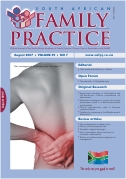Reconsidering management for otitis media with effusion in children
Keywords:
Otitis media with effusion, tympanoplasty, developmental outcomes, hearing loss
Abstract
Otitis media is the most commonly diagnosed illness apart from the common cold and treatment by insertion of tympanoplasty tubes is the most frequent operation in children beyond the neonatal period. Approximately nine in every ten children have had at least one episode by the age of two years and figures for South Africa may even be higher. Recent research findings have led to a more conservative approach to treatment of otitis media with effusion as opposed to previous recommendations for prompt insertion of tympanostomy tubes to avoid suspected developmental delays due to the mild conductive hearing loss. A large scale longitudinal clinical trial has demonstrated that prompt versus delayed insertion of tympanostomy tubes does not affect developmental outcomes and therefore a conservative approach of monitoring the condition and hearing status alongside speech and language development is recommended without the use of medication as routine management. These recommendations may ultimately result in significant healthcare savings for South Africa but must be implemented within a collaborative team approach to ensure developmental outcomes are not compromised due to poor surveillance.
Published
2007-08-02
Section
Editorials
By submitting manuscripts to SAFP, authors of original articles are assigning copyright to the South African Academy of Family Physicians. Copyright of review articles are assigned to the Publisher, Medpharm Publications (Pty) Ltd, unless otherwise specified. Authors may use their own work after publication without written permission, provided they acknowledge the original source. Individuals and academic institutions may freely copy and distribute articles published in SAFP for educational and research purposes without obtaining permission.

